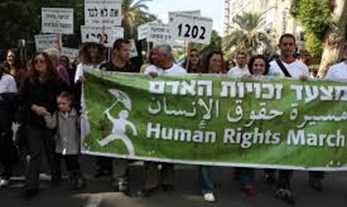


Will there be Arab Democracy?
Written By: Prof. Vernon Bogdanor
IDI International Advisory Council Member Prof. Vernon Bogdonor, Research Professor at the Institute of Contemporary History at King’s College in London, shares his thoughts on the Arab Spring in an op-ed originally published in The Jewish Chronicle.

Abstract: Health Inequality of Arabs and Jews in Israel
Written By: Shlomit Kagya, Nabil Khattab
A paper that reviews the state of research on health inequality between Jews and Arabs in Israel in order to develop a comprehensive research program that will contribute to the understanding of the factors leading to inequality.

The Duty to Defend Human Rights Defenders
Written By: Prof. Yuval Shany
Does Israel have an obligation to defend the rights of human rights NGOs under international law? IDI Senior Fellow Prof. Yuval Shany discusses the international legal framework relevant to this issue, the duties to respect and ensure human rights, the obligation to offer effective remedies to victims, and the specific obligation to defend human rights defenders.

Shooting the Messenger: Silencing NGOs in Israel
Written By: Shiri Krebs
On November 13, 2011 the Knesset Ministerial Committee on Legislation voted in favor of two private bills designed to impose restrictions on foreign funding of NGOs in Israel. In the following op-ed, published prior to the Committee's meeting, Attorney Shiri Krebs warns of the dangers of these bills.

A Jewish and Undemocratic State?
Written By: Prof. Yedidia Z. Stern
The proposed "Basic Law: Israel – The Nation State of the Jewish People" has the support of one third of the members of Knesset. In this op-ed, which was originally published in Hebrew in Yedioth Ahronoth, IDI Vice President of Research Prof. Yedidia Z. Stern, who is deeply committed to the Jewish nature of the State of Israel, warns that the shift from defining Israel as a "Jewish and democratic state" to a "Jewish state with a democratic regime" is not a semantic shift, but a seismic change.

Listen to the Language: The Young People's Protest of 2011
Written By: Dafna Gruber
In this op-ed, Dafna Gruber, Head of IDI's Young Leadership Forum, reflects on the wave of social protest in the summer of 2011, and points to what it reveals about the nature of young people in Israel today.

Employment Among Israeli Arabs
The percentage of Arabs in the labor market is lower than that of other groups in Israeli society and is among the lowest in the world. Because this discrepancy is based on national-religious schisms, raising the Arab employment rate has important economic, social, and political-national implications. Find out more about this issue in this report, which was submitted by IDI's Arab-Jewish Forum to the Committee for Socio-Economic Change headed by Professor Manuel Trajtenberg.

Trends in Wage Gaps between Arabs and Jews, 1997–2009
A research study conducted under the auspices of IDI’s Arab-Jewish Relations project on wage gaps between Jews and Arabs in the Israeli labor market in 1997–2009.

The Responsibility of a Sovereign State
Written By: Prof. Yedidia Z. Stern
The terms of the Gilad Shalit swap presented Israel with a conflict between the interests of an individual and the interests of the collective. Prof. Yedidia Z. Stern discusses the factors that contribute to Israel's extreme sensitivity to captives, warns of the dangers of choosing the individual over the collective, and calls for steps to be taken to ensure that Israel will have firm guidelines for such situations in the future.

Prof. Tamar Hermann on the 2011 Israeli Democracy Index
Written By: Prof. Tamar Hermann
On September 25, 2011, IDI presented the 2011 Israeli Democracy Index to President Shimon Peres. Prof. Tamar Hermann, the director of IDI's Guttman Center and co-author of the Index, discusses the findings of this year's study in this video interview.

The Democratic Year in Review: The Knesset's Missed Opportunity
Written By: Prof. Yedidia Z. Stern
The period of the Jewish High Holidays is a time of reflection and introspection. In this op-ed, originally published in Yedioth Ahronoth on September 26, 2011, IDI Vice President of Research Prof. Yedidia Z. Stern reflects on the gap that emerged between the agenda of the Knesset and the agenda of the Israeli public during 2010-2011 and expresses hope that the message of the social-economic protest of the summer of 2011 will point the Knesset in the right direction in the year to come.

Trajtenberg Did Not Rise to the Occasion
Written By: Momi Dahan
The establishment of the Trajtenberg Committee was a significant and substantial step in the social justice movement, but many found the Committee’s recommendations to be disappointing. IDI Senior Fellow Dr. Momi Dahan shares his views on the Committee's recommendations.

U.N. Recognition of a Palestinian State: A Legal Analysis
Written By: Prof. Amichai Cohen
The Palestinian Authority has announced its intention to declare the establishment of an independent Palestinian State in September 2011, and to ask the U.N. to recognize that state. What is the significance of U.N. recognition? Can the U.N. establish a state? Find out in this legal analysis by IDI Research Fellow Dr. Amichai Cohen.

The Housing Protest as an Expression of Civic Involvement
Written By: Ricki Tessler, Michal Barak
The wave of protest that swept over Israel in the summer of 2011 is an excellent springboard for discussion in civics classes in the Israeli school system. As a result, IDI was involved in the development of a curriculum on the housing protest with units for elementary school, junior high school, and high school.

Nows the Time for a Constitution
Written By: Prof. Mordechai Kremnitzer, Dr. Amir Fuchs
History teaches that adopting a constitution is usually possible only at the point at which a state is first established; if that opportunity is missed, it is only at a time of real crisis that it is politically feasible to set new rules of the game. In an op-ed in <em>Haaretz</em>, IDI Vice President of Research Prof. Mordechai Kremnitzer and Attorney Amir Fuchs assert that such a moment has come.

The Significance of International Recognition of the State of Palestine
Written By: Prof. Yuval Shany
United Nations recognition of Palestine as a state would confront Israel with complex challenges, but would also have some hidden benefits. IDI Senior Fellow Prof. Yuval Shany describes the risks and potential opportunities contained in such international recognition.

Solutions to Israel's Social-Economic Distress: An Interview with Prof. Avi Ben-Bassat
Written By: Avi Ben-Bassat
In this interview, originally published in the Globes financial daily, IDI Senior Fellow Avi Ben-Bassat, former director general of the Ministry of Finance, reflects on the Netanyahu government's tax and expenditure policies, which he views as the cause of the economic protests of the summer of 2011.

Choosing between the Law and Torah
Written By: Jonah Mandel
Is the tension over the arrests of Rabbis Dov Lior and Ya’acov Yosef a precursor to an inevitable collision between Halakha and the judiciary? IDI Vice President of Research Prof. Yedidia Stern shared his views on this question with Jonah Mandel of The Jerusalem Post.

A New Social-Economic Agenda for Israel
Written By: Momi Dahan
In an op-ed, originally published on the Ynet website, IDI Senior Fellow Dr. Momi Dahan reflects on the wave of social protest of the summer of 2011 and stresses that the response to the protest must be a new social-economic agenda.

On the Way to Venezuela
Written By: Prof. Mordechai Kremnitzer
In an op-ed in <em>Haaretz</em>, IDI Vice President of Research Prof. Mordechai Kremnitzer and Attorney Shiri Krebs respond to a proposed amendment to the Associations Law that would prevent non-profit organizations from receiving contributions from "governments and international bodies like the United Nations and European Union."

Should Sunday Be a Day of Rest in Israel? An Interview with Prof. Avi Ben-Bassat
Written By: Matan Shefi, Avi Ben-Bassat
Should Sunday be a day of rest in Israel? This debate was reawakened In July 2011, when Vice Prime Minister Silvan Shalom proposed that Israel should have a long weekend that would be in sync with the rest of the world. IDI Senior Fellow Prof. Avi Ben-Bassat believes that this is populist legislation and that the public is not being fully informed of its ramifications.

Should Sunday be a Day of Rest in Israel? An Interview with Dr. Arye Carmon
Written By: Matan Shefi, Dr. Arye Carmon
Should Sunday be a day of rest in Israel? This debate was reawakened In July 2011, when Vice Prime Minister Silvan Shalom proposed that Israel should have a long weekend that would be in sync with the rest of the world. IDI Former President and Founder Dr. Arye Carmon believes that this change is necessary, but must be implemented as part of a comprehensive social change aimed at bridging the gap between religious and secular Jews.

The Making of Religious Zionist Extremists
Written By: Yair Sheleg
In this op-ed from Haaretz, IDI Research Fellow Yair Sheleg reflects on the recent public debate over the Rabbi Dov Lior affair, and wonders why the religious Zionist camp was not as concerned about the contents of the book that Rabbi Lior endorsed as it was about his arrest.

Say No to the Boycott Bill
Written By: Prof. Mordechai Kremnitzer
In an op-ed in Maariv, IDI Vice President of Research Prof. Mordechai Kremnitzer and IDI Researcher Attorney Amir Fuchs explain why the "Bill to Prevent Harm to the State of Israel Through Boycotts” poses a serious threat to freedom of expression in Israel.

A Tragedy of Errors
Written By: Prof. Yedidia Z. Stern
In an op-ed originally published in Haaretz on June 18, 2010, IDI Vice President Prof. Yedidia Z. Stern responds to the dramatic events in the city of Immanuel, warns secular society about the growing demonization of the Haredi community, and urges the Haredi community to have greater faith in the courts—the ultimate protectors of the rights of minorities.

The Integration of Ultra-Orthodox Young Adults in the Israeli Economy
Written By: Aviad Hacohen
An interview with Dr. Aviad Hacohen, Dean of the Sha'arei Mishpat Academic College, that was conducted prior to IDI's 19th Caesarea Economic Policy Planning Forum, at which Dr. Hacohen and fellow researcher Dr. Lee Cahaner presented their findings on “The Forgotten Age in the Ultra-Orthodox Sector” during a session on Young Adults Aged 18–22.

Crossing the Syrian-Israeli Border: Acts of War or Disturbances?
Written By: Prof. Yuval Shany
The violent incidents that took place on the Israeli-Syrian border in June 2011 raise the question of how the Israel Defense Forces should deal with violent events that resemble disturbances while at the same time affecting important Israeli security interests. IDI Senior Fellow Prof. Yuval Shany offers his analysis of the Israeli response to these events.

The Challenges Facing Israeli Rabbis Today
Written By: Prof. Yedidia Z. Stern
In anticipation of his forthcoming book on the challenges of rabbinic leadership in Israel, IDI Vice President for Research Prof. Yedidia Z. Stern, shares his opinion on the role of rabbis in Israeli society.

The Iron Wall
Written By: Prof. Tamar Hermann
In this op-ed from the bitterlemons-api.org website (June 1, 2011), IDI Senior Fellow Prof. Tamar Hermann contends that Israelis have been turning a blind eye to the Arab Peace Initiative (API) due to a cognitive "iron wall" that stands between them and the rest of the Middle East. She supports her argument with data from the Peace Index polls.

